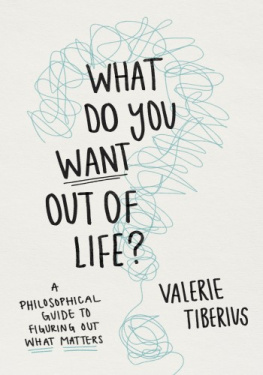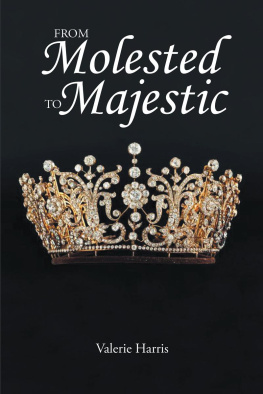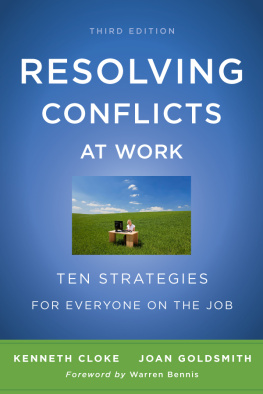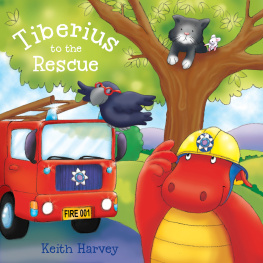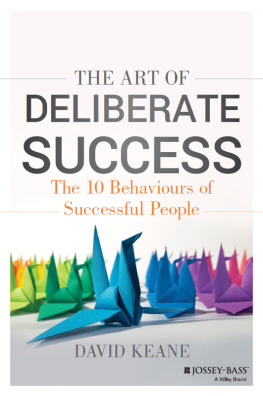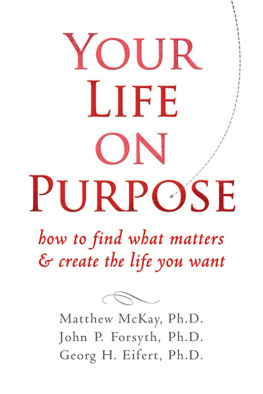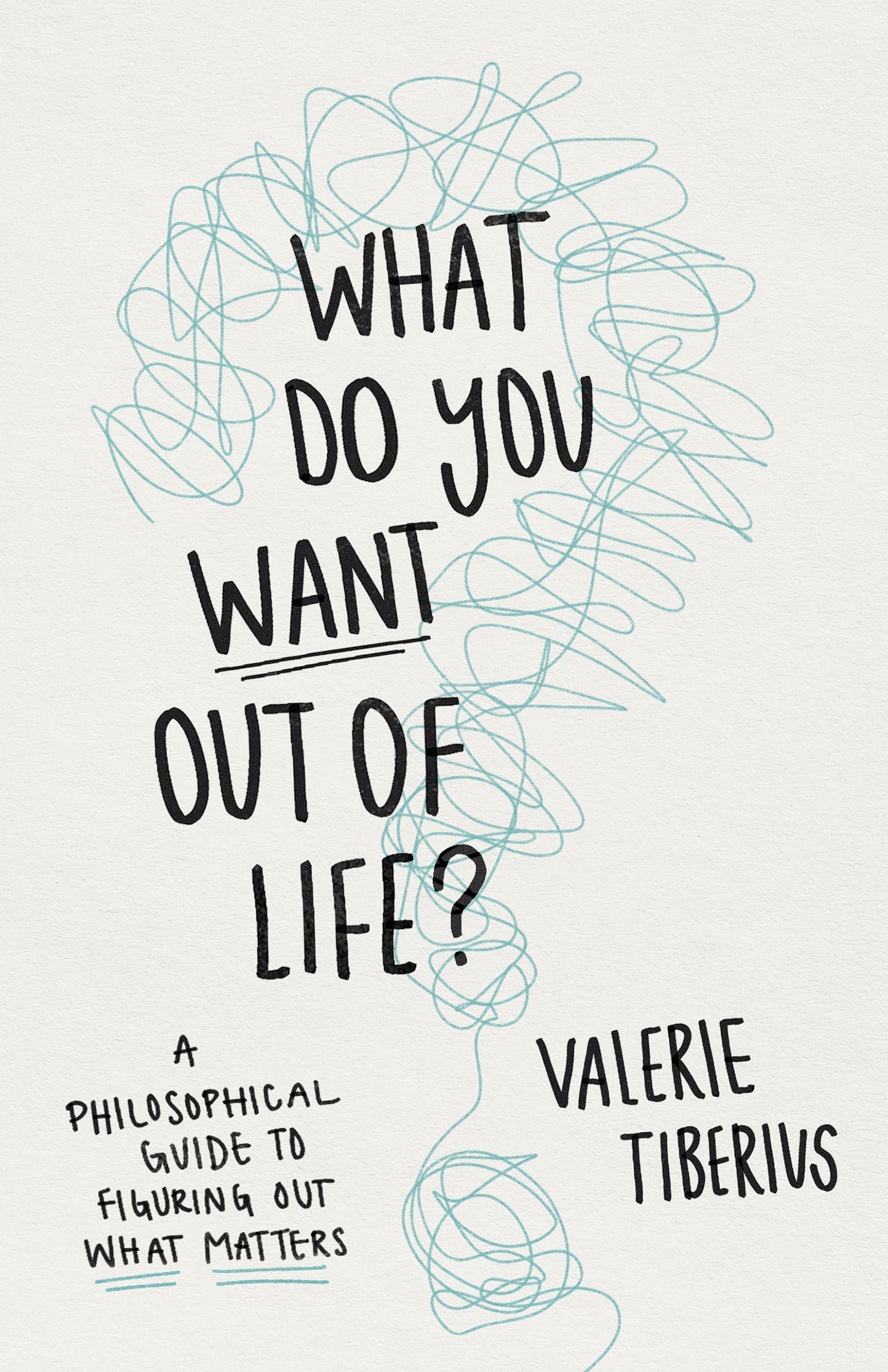WHAT DO YOU WANT OUT OF LIFE?
WHAT DO YOU WANT OUT OF LIFE?
A PHILOSOPHICAL GUIDE TO FIGURING OUT WHAT MATTERS
VALERIE TIBERIUS
PRINCETON UNIVERSITY PRESS
PRINCETON AND OXFORD
Copyright 2023 by Princeton University Press
Princeton University Press is committed to the protection of copyright and the intellectual property our authors entrust to us. Copyright promotes the progress and integrity of knowledge. Thank you for supporting free speech and the global exchange of ideas by purchasing an authorized edition of this book. If you wish to reproduce or distribute any part of it in any form, please obtain permission.
Requests for permission to reproduce material from this work should be sent to
Published by Princeton University Press
41 William Street, Princeton, New Jersey 08540
99 Banbury Road, Oxford OX2 6JX
press.princeton.edu
All Rights Reserved
ISBN 9780691240688
ISBN (e-book) 9780691240695
Version 1.0
British Library Cataloging-in-Publication Data is available
Editorial: Rob Tempio and Chloe Coy
Production Editorial: Sara Lerner
Text Design: Heather Hansen
Jacket Design: Faceout Studio, Molly von Borstel
Production: Erin Suydam
Publicity: Maria Whelan and Carmen Jimenez
Copyeditor: Katherine Harper
For my sisters, Paula and Kiry
CONTENTS
- ix
- xv
- 1
- 15
- 31
- 58
- 86
- 102
- 112
- 131
- 158
- 161
- 165
- 177
PREFACE
I could not have been more surprised to discover that life doesnt sort itself out as you get older. Thats what I thought in my twenties: that by the time I was in my fifties, I would have it all figured out. Sure, some things get more settled, your options shrink, you become more certain in some areas. But there are so many changes to adapt to that you never end up just coasting. This book is motivated by a desire to understand how we should think through our choices, goals, and values in the face of continual change. If theres no coasting, how do we keep moving so that our lives go as well as they can?
Of course, as I write this in 2022, continual change is also on my mind because of recent events. The COVID-19 pandemic and the near-collapse of American democracy gave us all a lot of new things to deal with. For those of us lucky enough to keep our jobs and to be relatively secure, the pandemic created a lot of doubt and worry. It has been easy to wonder about the point of doing whatever it is were doing with so much of our time (teaching philosophy, in my case) when were on the brink of disaster. These thoughts led me to think it would be worthwhile to write something that might be of interest to more than my typical audience of twenty academic philosophers. They also led me to think about how we anchor ourselves in times of upheavalabout the values that give us purpose and how we should think about them.
The truth is that Ive always thought about these questions. Whats new is just that Im thirty years older than when I started. Being a philosopher, I thought there should be some philosophy to help me think about these topics. There is, but not as much as I thought. Ancient philosophy has some good stuff, but there have been some important changes in the last two thousand years. Recent philosophy has become so technical and specialized that I havent found it that helpful. Also, so much of the kind of philosophy I have been trained to read was written by white men; when it comes to questions about how to live my life, I have often felt there are things we dont have in common. When Ive heard white men talk about a midlife crisis, for example, it tends to be about coping with not being the Great Men they were told they would be. No one ever thought I would be a Great Man, so this hasnt been an issue for me. Many of the issues I have had are tied up in some way with sexism and bias. So this book is also motivated by a desire to write something about living a good life that is from a womans point of view.
In the past decade or so, psychologists have more or less taken over from philosophers in writing about happiness. But I havent found that psychological research answers my questions either. Much of the research is wonderful and interesting, but it doesnt give me a general way to think about how to live my life. Psychology has helped me figure out how to meet certain goals that I already have: I know that if I want to feel happier, for example, I should count my blessings, and that if I want to feel connected to other people, I should practice active constructive responding. But psychology doesnt provide a general approach to thinking about life, nor has it helped me put all the different pieces of advice together.
What I have always liked about philosophy is its focus on the big questions and its unremitting effort to synthesize what we know about ourselves and the world. At its best, it can provide a coherent way of looking at things so that we can muddle through life more sensibly than we might otherwise. So this is a philosophical guide rather than a self-help book. It doesnt contain a ten-step program to happiness, wealth, or weight loss. Instead, it offers a way of thinking about what matters in life that helps us deal with the challenges of conflicting goals, lack of information, and an often uncooperative world.
As I write these words, Im very conscious of the fact that the main obstacles to living well for most of the worlds population come from external sources, not from inner conflict. Injustice, poverty, oppression, inadequate healthcare, unfair labor practices, and so on are enormous obstacles to living well. They raise complex political and economic questions that are not my expertise. I do think that those of us fortunate enough not to be impeded by such daunting external obstacles ought to think about our role in solving problems like these, and while this book isnt going to save the world, it does offer tools for thoughtful people to get their priorities straight.
Since philosophical thinking tends to be very abstract, I have tried to use a lot of examples to illustrate the theoretical points I make. Often, I use myself as an example, and I have to admit that talking about personal examples in this way feels strange to me, since its not what philosophers usually do. Instead, we tend to talk about generic characters A and B who do generic actions like -ing and -ing at time t1 or t2. Sometimes we get more realistic and make up characters who have names (like Anna and Bob!), but its not usual in the tradition in which I was raised to talk about ones own life in any detail. I dont think that thinly described examples of hypothetical people are good enough for this subject matter. The kind of process that is involved in understanding our goals and values depends heavily on the details of a persons life. So to illustrate the process in this book, I had to talk about experiences I know well enough to be familiar with those details. Fortunately, Im fairly sure my experiences are not unique and I am hopeful that they will resonate with my readers. Ive also tried to add less-detailed examples based on friends and people Ive read about wherever I can.
One thing I talk about in some depth is being a woman in a field that hasnt been particularly welcoming to women. The experience of being marginalized is really not something that is discussed in the literature on happiness and well-being. Philosophers who write about well-being and happiness have tended to talk about generic individuals rather than women or men, Black people or Asian people, and so on. This seems to me problematicat least when we try to apply our philosophy to the real worldbecause how we cope with our social world is tremendously important to how well we can flourish. Its useful to talk about the context of prejudice and oppressive socialization because were better able to cope with something once we recognize how it affects us.


